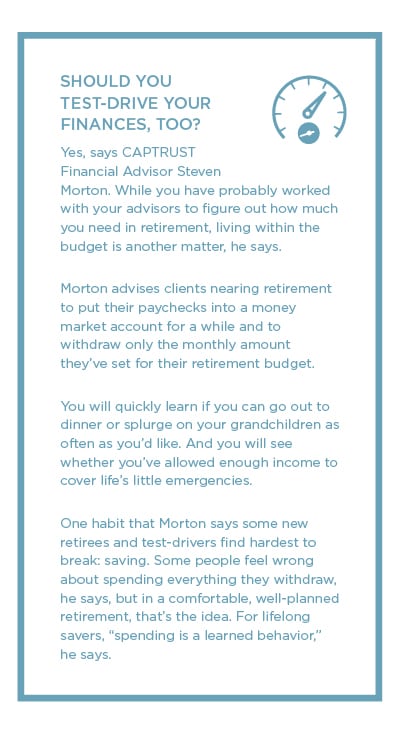Try It On for Size
Today’s healthy retirees may live 25 years or more beyond their primary working years. That’s a lot of years. But more importantly, that’s a lot of days—more than 9,000 days to wake up, greet the dawn, and then . . . What?
Maybe you picture days filled with tennis, boating, reading, travel, volunteer work, or a part-time job. You may imagine spending time with your spouse, friends, grandchildren, or new acquaintances who share your pastimes.
But what if you did more than just imagine—and gave your retirement at least as much consideration as a new car? In other words, what if you took your retirement plans for a test-drive?
Kevin Deiters, 60, of Austin, Texas, has done something like that twice in the past decade, when he voluntarily left jobs and took several months off, knowing he would return to work eventually. During those career breaks, he says, he learned how important it was to have a sense of purpose. In his case, that included increasing his volunteer work with the National Forest Service and a trail-building group.
“The thing with having a regular job is that you are kind of on autopilot,” says Deiters, who is now executive director for the Texas state pension system for volunteer firefighters.
When you get a taste of retirement, you learn that “you have to get up and plan each day,” he says. “You need something to belong to, something to do.”
It’s a lesson more of us might learn if we took off a few weeks or even a few months to wake up each day and live like retirees—and find out just how much mileage we really might get out of our plans (and our budgets). But retirement experts say that if you can’t do that, it’s still possible to test-drive aspects of retirement.
The goal: to avoid the scenario that executive coach Marilyn Bushey, of Dallas, says she heard about from one client. The man’s father always said that when he retired, “he was going to go fishing every day,” says Bushey, who, with fellow coach Gail McDonald, is the co-author of a book called Retirement Your Way. “When he actually retired, he went fishing three times the first week, two times the second week, and then he never went fishing again.”
If the fishing enthusiast had test-driven his boat-based lifestyle, he would have learned that he needed a bigger retirement plan. Many people do, experts say.
I ask people all the time, ‘What are you going to do in retirement?’ and they say, ‘We’re going to golf, we’re going to travel,’ and I tell them that’s not going to be enough.
Steven Morton, a CAPTRUST financial advisor in Greensboro, North Carolina.
Morton says he has not had any clients who took significant time off work to test-drive their plans. “In the real world, it’s very difficult to take a sabbatical,” he says.

Patrice Jenkins, a retirement consultant and author of What Will I Do All Day?, says many people, especially those in corporate jobs, are hesitant to “show their cards” while plotting career exits because they fear they will be sidelined prematurely.
But those concerns should not stop anyone from test-driving aspects of their retirement plans, she and other planning experts say.
“I advise a modular approach,” says Joe Casey, a coach at Retirement Wisdom in Princeton, New Jersey. “Start to look at the different parts of your life that are most important … and find ways to test those.”
Here are a few common retirement goals and how you might test them out.
Making a Big Move
One of the biggest mistakes new retirees make is immediately selling their home and buying one in a new community, says Seattle-based career and retirement coach Robin Ryan, author of Retirement Reinvention. Too many end up isolated and unhappy in a place that’s not right for them, she says.
The best way to avoid that mistake is to rent for at least a few months in your target location, she says. You could do that during a sabbatical or other career break.
Another option: living part time in a new locale while starting to scale back on your career.
That’s what Jenkins, 61, and her husband, a 68-year-old veterinarian, have done. They own one home in the rural area where he continues to practice part time and another in downtown Saratoga Springs, New York. They rented before they bought in their new neighborhood.
If you can’t manage a months-long rental, you should at least spend a week or two in your prospective location “not in vacation mode,” Casey says.
Check out the medical facilities, educational facilities. Spend time talking to the locals. Really get a sense of what a week would be like, what a day would be like, if you were living there.
Joe Casey
If you are thinking of living somewhere year-round, visit that spot year-round. If it’s a tourist spot, visit at busy and less busy times.
“Some people will find that places that they really liked when they visited as a tourist are a lot more boring when they go there not in vacation mode,” Casey says.

Something you don’t notice or don’t mind as a tourist can turn into a deal-breaker when you are a resident. Morton says he knew one man “who always wanted to retire next to the beach.” So he bought some property and, while he was having a house built, rented nearby. “What he discovered was that he had to wash sand out of his sheets every night—and he hated it,” Morton says. When the new house was finished, the man sold it and moved elsewhere.
Devoting Yourself to a Favorite Activity
You may think you will never get too much golf or tennis. But most people do find “that playing endless rounds of golf every day gets really boring,” Morton says. And there are other realities that might become apparent during a long-enough retirement test-drive.
“The truth is that your body is not going to allow you to play golf every day or play tennis seven days a week,” Ryan says.
Maybe you think you would take up some new hobby. Even if you can’t take a lot of time off to explore your interests, it’s a great idea to experiment while you are still working, experts say. You may find a new passion, or you may find disappointment.
That’s what happened to Bushey, who is 72 and working fewer hours than she used to. “I thought I might like to build kaleidoscopes in my retirement,” she says, so she signed up for a kaleidoscope-building class. “I found out that I didn’t like to use a soldering iron,” she says. “So instead of building them, I started a collection.”
Jenkins had a similar experience with pottery-making. “I took a couple of lessons and found out that it’s really hard and that I’m not passionate about it,” she says. Jenkins adds the caveat “that sometimes you have to give something time to find out whether you might become passionate about it.” Think about what “your future self” might like, she suggests.
Jenkins says, with that in mind, she might give pottery another try someday—but now she knows it won’t be easy.
Spending Time with Your Spouse or Friends
“Work has all this built-in socialization,” Jenkins notes. In retirement, maintaining relationships and social ties can take a new level of effort. And the effort may need to start at home.
Retiring couples may find they have differing plans, interests, and expectations. A retirement test-drive period is a good time to work on reconnecting, Ryan says.
“Develop a couple’s activity you can do together,” she says, even if it’s as simple as going to dinner and a movie together once a week. And talk about how much time you expect to spend together.
What about friends?
One thing many younger retirees or test-drivers discover is that they struggle to find golf, hiking, or card buddies on a random Wednesday morning. And the last thing they want to do is to check out the local senior center—which many perceive, rightly, as geared toward much older folks.
Robin Ryan
The solution, Ryan says, is to become an organizer. So, if you have some time off, “host a poker game or a new book club,” she says. “Invite people you know and invite new friends.”
Also, reconsider groups you may have overlooked in the past. Ryan says she’s found that her local Rotary Club is a great place to make social connections.

Going Back to School
Many retirees are eager to learn, and options abound. You can take courses online or in person, for credit or not, for new career skills, or just for fun. If you are thinking of investing in an advanced degree or any other option that will require a lot of time and money, it’s a good idea to test yourself first, Ryan says. The best way to do that, she says, is to audit one or more college courses. You can often do it free or for a minimal fee, especially if you are over age 60. Rules vary state to state.
Though auditing students do not get credit, “you should buy the books and do the work,” Ryan says, to see if the rigors of academia are a good fit for you at this life stage.
Leading for a Good Cause
Hard-driving careerists often see retirement as a chance to use their leadership skills for the greater good. That’s a wonderful thing, Morton says, but too many people end up charging into situations that are not good fits. In his book, Ten Common Mistakes Retirees Make, Morton says that the best way to test your fit is to work in the organization’s trenches.
So, before you start a new chapter of Habitat for Humanity and promise to build 200 houses in six months, he writes, “why not be one of the rank-and-file [volunteers] and drive 200 nails? By then, you’ll know whether you really want to be involved in Habitat for Humanity for the rest of your life, or whether it was an idea that didn’t quite pan
out … The best advice: Try before you buy.”